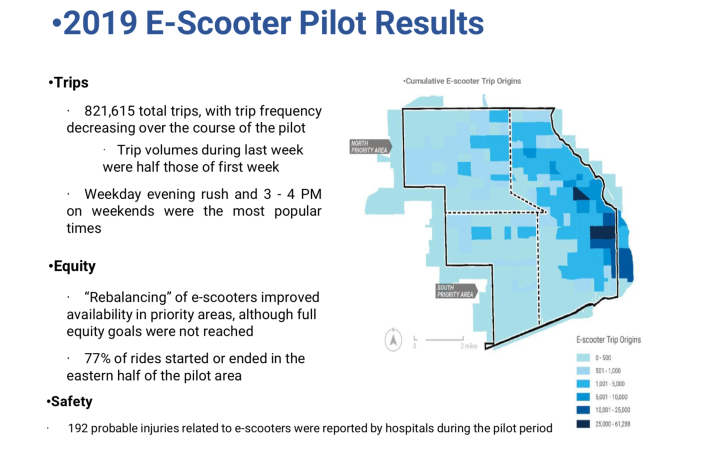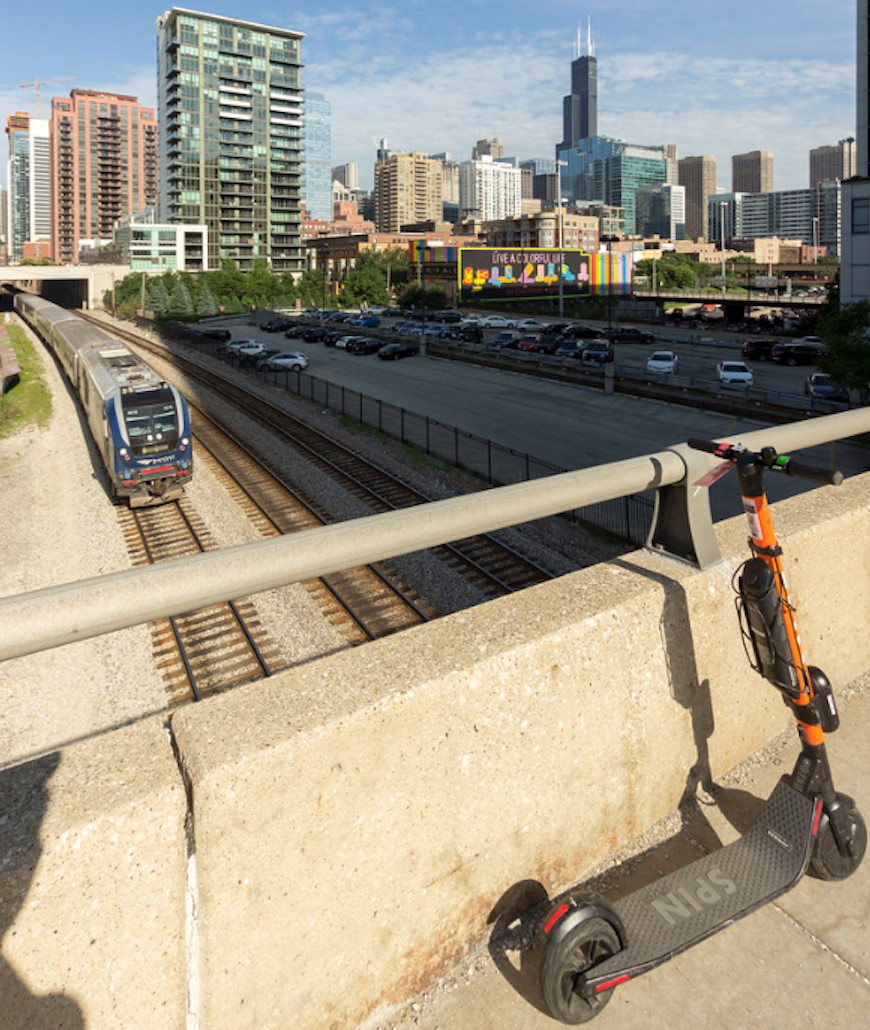At yesterday's quarterly Mayor's Bicycle Advisory Council meeeting, assistant Chicago Department of Transportation commissioner Sean Wiedel provided an update on the city's next dockless electric scooter pilot.
Last year CDOT and the Chicago Department of Business and Consumer Protection ran a pilot from June to October, involving 10 companies with a total of 2,500 scooters. The test area was limited to West and Northwest side neighborhoods, and there were two priority zones in the two westernmost quadrants of the pilot area, where the vendors were required to deploy a total of 50 percent of their fleets as an equity strategy. The rules also required the scooters to be removed from the streets every night to reduce the potential for intoxicated riding and vandalism. CDOT has released the trip data on the city's data portal.
There were 821,615 trips, with the most popular times being rush hours and 3-4 p.m. on weekends, Wiedel said. Despite having the West Side priority zones, 77 percent of the rides started or ended in the eastern half of the pilot area, particularly in the West Loop and Wicker Park.
Wiedel said there were a 192 "probable" scooter-related emergency room visits during the pilot. "We asked hospitals to note if there was a scooter involved in an injury of someone visiting an emergency room, and we did our best to go back through all the data and identify the ones that were probably related to an e-scooter [as opposed to a non-electric or gas-powered scooter.]"
Margarita Reina, a senior epidemiologist at the Chicago Department of Public Health, added that her department has access to the Center for Disease Control's National Syndromic Surveillance Program ER visit data. "So [that's] all of our Chicago hospitals, but we also have the hospitals that are outside of Chicago," such as Oak Park and Evanston. She said she looked at data in some suburban hospitals to see if any Chicago e-scooter users might have wound up in suburban ERs.
Unsurprisingly, Wiedel said, the biggest complaints the city received about the pilot were people riding scooters on sidewalks and poor parking behavior. "But we didn't see piles of scooters all over the place... So we really felt it was worth doing another pilot this year."

A whopping 12,000 people responded to the city's scooter survey -- that's about one out of every 200 Chicagoans. The participants were roughly split between people that had ridden and people who hadn't. 59 percent of survey respondents said that rentable e-scooters should continue to be available in Chicago, with 21 percent of non-riders supporting e-scooters, compared to 84 percent of riders.
Wiedel said the next pilot will focus on addressing the sidewalk riding and parking issues, as well as community engagement, since the survey indicated that the demographics of the scooter riders (or at least the ones who responded to the questionnaire) skewed whiter and wealthier than the demographics of the pilot area.
The assistant commissioner said he came to MBAC directly from a scooter pilot meeting. "We are in the process of developing what our next pilot looks like." The city intends to reduce the number of participating vendors from 10 last year to two or three this year, using quantitative criteria to make the decision, including factors like past performance. Wiedel said the pilot area will likely be larger than last year.
City officials hope to include a "lock-to" requirement, with vendors providing scooters with built-in locks for securing them to bike racks or poles, which will help keep the devices out of the way of pedestrians. Users would be require to lock the scooter in order to end the charges for their trip. To prevent a bike parking crunch, I'd recommend that the city require the companies to fund additional parking racks, ideally creating dedicated on-street scooter parking corrals.
While the vendors were required to offer programs for unbanked Chicagoans and people without smartphones, Wiedel said there was little participation from residents. "There were a lot a lot of hurdles to participation... Scooter companies often had only one location to sign up, open relatively limited hours, etc., which made it really difficult for people to access that."
Reina asked Wiedel what the main concerns of people from the western priority zones were in terms of infrastructure, scooters speeds, and questions of whether the program was really intended for them. "I talked to some people I know that are from [Little Village] but I didn't get a clear picture of that."
Weidel responded that, while the scooter pilot got plenty of press, and social media promotion by the city, "we did hear fairly consistently, 'We didn't know anything about this -- the scooters just showed up.'" Obviously, to get more participation, with rider demographics that reflect Chicago's ethnic and economic diversity, more outreach and more accessible programs for residents who are unbanked and/or lack smartphones.




